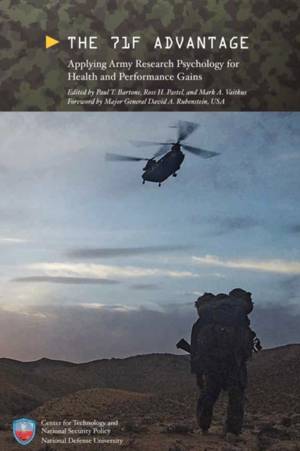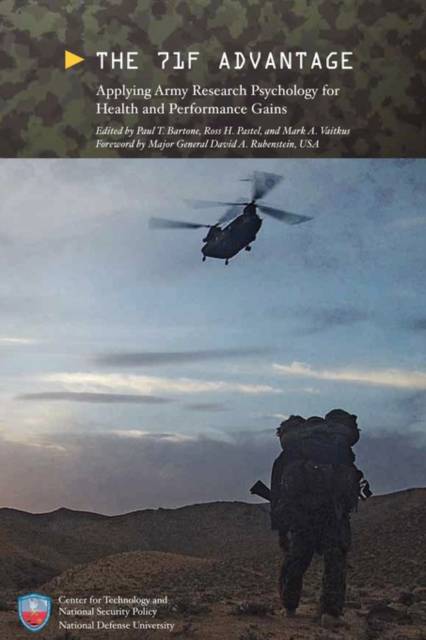
- Afhalen na 1 uur in een winkel met voorraad
- Gratis thuislevering in België vanaf € 30
- Ruim aanbod met 7 miljoen producten
- Afhalen na 1 uur in een winkel met voorraad
- Gratis thuislevering in België vanaf € 30
- Ruim aanbod met 7 miljoen producten
Zoeken
The 71F Advantage
Applying Army Research Psychology for Health and Performance Gains
National Defense University Press
Paperback | Engels
€ 51,45
+ 102 punten
Omschrijving
Includes a foreword by Major General David A. Rubenstein. From the editor: "71F, or "71 Foxtrot," is the AOC (area of concentration) code assigned by the U.S. Army to the specialty of Research Psychology. Qualifying as an Army research psychologist requires, first of all, a Ph.D. from a research (not clinical) intensive graduate psychology program. Due to their advanced education, research psychologists receive a direct commission as Army officers in the Medical Service Corps at the rank of captain. In terms of numbers, the 71F AOC is a small one, with only 25 to 30 officers serving in any given year. However, the 71F impact is much bigger than this small cadre suggests. Army research psychologists apply their extensive training and expertise in the science of psychology and social behavior toward understanding, preserving, and enhancing the health, well being, morale, and performance of Soldiers and military families. As is clear throughout the pages of this book, they do this in many ways and in many areas, but always with a scientific approach. This is the 71F advantage: applying the science of psychology to understand the human dimension, and developing programs, policies, and products to benefit the person in military operations. This book grew out of the April 2008 biennial conference of U.S. Army Research Psychologists, held in Bethesda, Maryland. This meeting was to be my last as Consultant to the Surgeon General for Research Psychology, and I thought it would be a good idea to publish proceedings, which had not been done before. As Consultant, I'd often wished for such a document to help explain to people what it is that Army Research Psychologists "do for a living." In addition to our core group of 71Fs, at the Bethesda 2008 meeting we had several brand-new members, and a number of distinguished retirees, the "grey-beards" of the 71F clan. Together with longtime 71F colleagues Ross Pastel and Mark Vaitkus, I also saw an unusual opportunity to capture some of the history of the Army Research Psychology specialty while providing a representative sample of current 71F research and activities. It seemed to us especially important to do this at a time when the operational demands on the Army and the total force were reaching unprecedented levels, with no sign of easing, and with the Army in turn relying more heavily on research psychology to inform its programs for protecting the health, well being, and performance of Soldiers and their families."
Specificaties
Betrokkenen
- Auteur(s):
- Uitgeverij:
Inhoud
- Aantal bladzijden:
- 548
- Taal:
- Engels
Eigenschappen
- Productcode (EAN):
- 9781907521652
- Verschijningsdatum:
- 1/09/2010
- Uitvoering:
- Paperback
- Formaat:
- Trade paperback (VS)
- Afmetingen:
- 152 mm x 229 mm
- Gewicht:
- 725 g

Alleen bij Standaard Boekhandel
+ 102 punten op je klantenkaart van Standaard Boekhandel
Beoordelingen
We publiceren alleen reviews die voldoen aan de voorwaarden voor reviews. Bekijk onze voorwaarden voor reviews.











